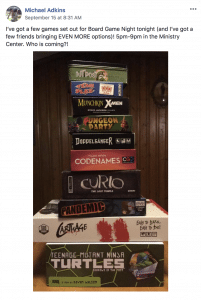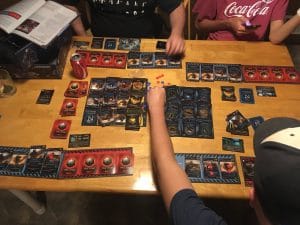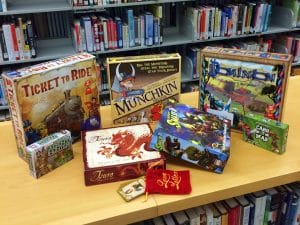Recently I had the idea to organize a tabletop game night for a community with whom I’m involved, and I was genuinely surprised at how little effort was required of me to pull it off and how much return I got on that tiny investment. Plus I got to play games for a few hours, too!
Win-win.
If you’re still reading this post, odds are fair that you might be interested in doing the same sometime. Awesome! Here’s the good news: It is fairly simple. If you follow these seven steps, you’re sure to have an easy time and, equally important, a good time!
[bs_smart_list_pack_start][/bs_smart_list_pack_start]
Advertise, advertise, advertise (and do so early).
People are busy, man! If you want them to show up in numbers, give them  plenty of heads up and hype it often. I scheduled mine two months in advance, announced it every week leading up to the event, and also further hyped it by posting pics of the games that would be available for play in the days leading up to the event in our Facebook Group.
plenty of heads up and hype it often. I scheduled mine two months in advance, announced it every week leading up to the event, and also further hyped it by posting pics of the games that would be available for play in the days leading up to the event in our Facebook Group.
And if the first night goes really well, word of mouth will carry some of this load for you going forward. The first question I asked the students when we were done was if they would do this again, and I was met with a resounding “YES.” When I get the next one on the calendar, I’ll look to them for validation amongst their peers about how awesome the evening was. A game night might have sounded lame coming from me, but when their friends speak directly to how much fun they had we should see a spike in attendance.
K.I.S.S.
If you want to guarantee that this game night thing doesn’t happen with regularity: Overcomplicate it.
Keep It Simple, Stupid.
This doesn’t have to be a massive production. All you really need to ensure is that you’ve got the space, the furniture, and a sufficient number of games for however many folks you’re expecting. I organized snacks and drinks for my group, but you can 100% make this a BYO___ situation and make things even easier on your end. Bottom line is that the easier it is for you to organize, the more likely you are to repeat it!
The biggest consideration might be tables.
We had the luxury of setting up three different kinds of tables:

Standard 3×3 card tables, 2.5×6 rectangular tables, and 5ft diameter round tables. Coup could easily be played at a card table; Xenoshyft cannot. King of Tokyo would require too much reaching at the circular tables, but they worked great for Codenames. When students decided on the game they wanted to play, we directed them to a free table that made sense for that game.
This might well prove the trickiest bit of planning for the evening. Most people aren’t swimming in tables after all, but ask around and you might find that a church, event rental company, homeowners association, or even your FLGS would be happy to lend or rent you tables (or even host your event!) if your friends and family have none you can borrow.
Pair the old and familiar with the new and adventurous.
Not everyone is going to leap at the idea of showing up to a game night which will feature absolutely nothing they’re familiar with. That will scare some folks right off, actually. Instead, promise that there will be some familiar games that everyone knows how to play available, too. Let them know they can come, enjoy a classic like Uno, and still be a part of the evening of fun! Some of the younger girls that came out played Uno for the first part of the evening. I didn’t swoop down on their table and try to shove Coup down their throats! I dropped by, spectated and chatted for a bit, enjoyed them enjoying themselves, and moved on.
Maybe they’ll try something new, maybe they won’t. What’s your goal here? Conversion of some sort, or fun?! I’m not of the opinion that these two things are mutually exclusive, but I will say that “converting” or introducing folks to heavier games will be easier if they’re having fun, so I’d err on that side of the false dichotomy!
Alternatively or simultaneously you can…
…Invite attendees to bring their favorites!
This was a major part of my hook for that evening: “Come and learn how to play something new from us, or bring a favorite of yours from home and teach us how to play it!” If you want others to be open to the idea of learning a new game from you, isn’t it only fair that you are open to learn a new game from them? I think so!
I love that some of our students brought their own games! One of them was a little bummed no one wanted to try the game they brought, so I said, “Hey, next time we do this, I want you to teach me how to play this game first thing. Deal?” And the excitement returned! A couple of our favorite games were left on the table, too. We didn’t see that as a bummer, but as all the more incentive to do this again sometime soon!
Variety is the spice of life.
Have a bunch of different play styles of tabletop games  available (deck builders, miniature games, co-op, competitive, party-style, etc). And consider offering games that support at least 3 players, if not 4 or more. Heck, have multiple copies of games you think might be hits on hand if you can! And you don’t have to rely upon your own library here. If you know some folks who have a bunch of games, call them up and ask if you can borrow a few – or even better…ask them to come and help host the gathering (more on that below).
available (deck builders, miniature games, co-op, competitive, party-style, etc). And consider offering games that support at least 3 players, if not 4 or more. Heck, have multiple copies of games you think might be hits on hand if you can! And you don’t have to rely upon your own library here. If you know some folks who have a bunch of games, call them up and ask if you can borrow a few – or even better…ask them to come and help host the gathering (more on that below).
And for Odin’s sake: PLEASE make sure you’ve got enough games on hand for the number of people you’re hoping show up. MORE than enough if possible. Waiting for table space to clear up is the worst. Sure, they might have to wait on a particular game, but in the meantime they can break something else out and stay engaged!
Recruit folks who know how to play the games offered.
SO much time can be reserved for playing when you have a knowledgable veteran player of that game on hand to guide new players through setup and gameplay. While most of the 30 games we had on hand for the evening were from two collections (mine and a friend’s), we were very intentional about pulling in a few other adults who had played many of these games with us for just this purpose.
Students would pick a game and we’d send someone who knew it well with them to at least get them set up and playing. Oftentimes that adult wouldn’t even stay at that table; let alone take up a player slot. We play these games week in and week out; this wasn’t necessarily our time to play them. Our primary goal was to facilitate the games for the attendees. That doesn’t mean we didn’t play any games that night, of course! That just wasn’t Goal #1.
[bs_smart_list_pack_end][/bs_smart_list_pack_end]
That’s it! With a little heads up and just a smidge of elbow grease, you’ll be able to put together a tabletop game night that’ll have folks asking when the next one will take place as the night winds down.

